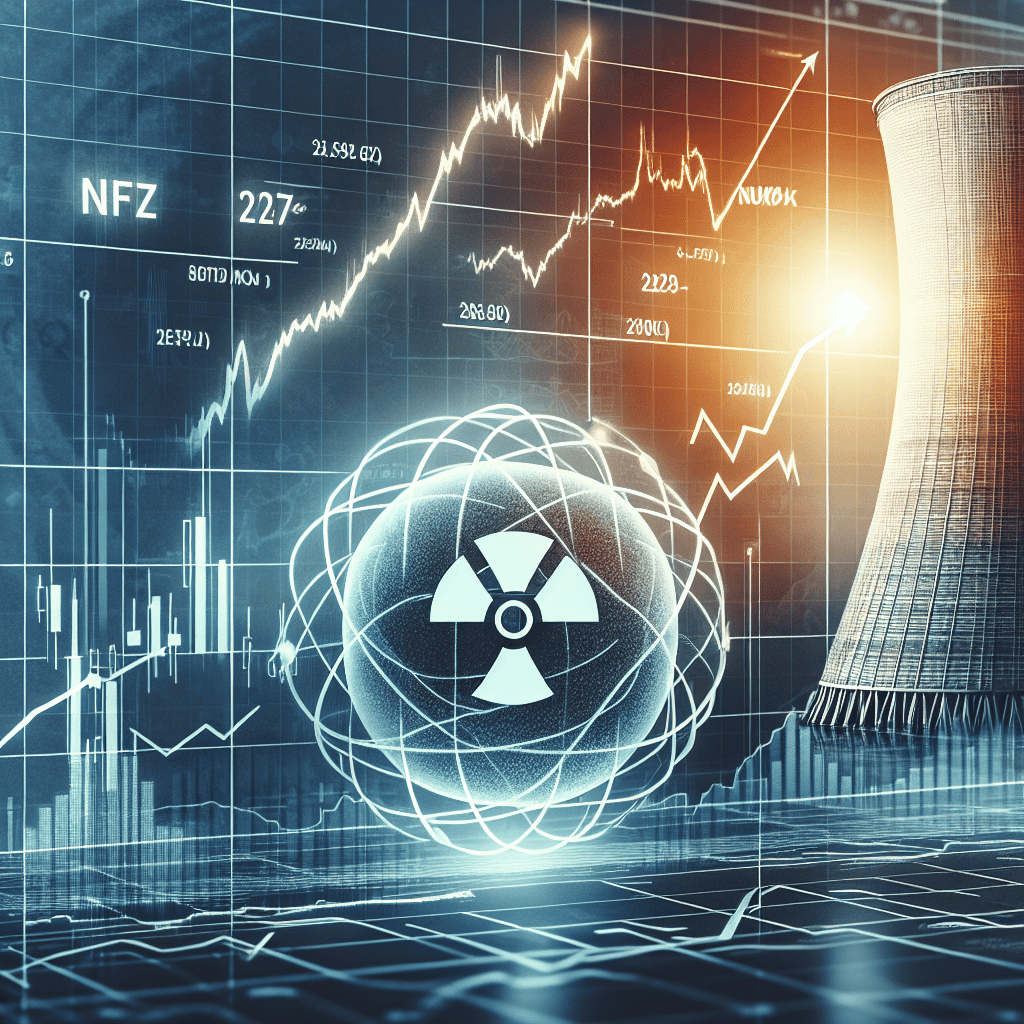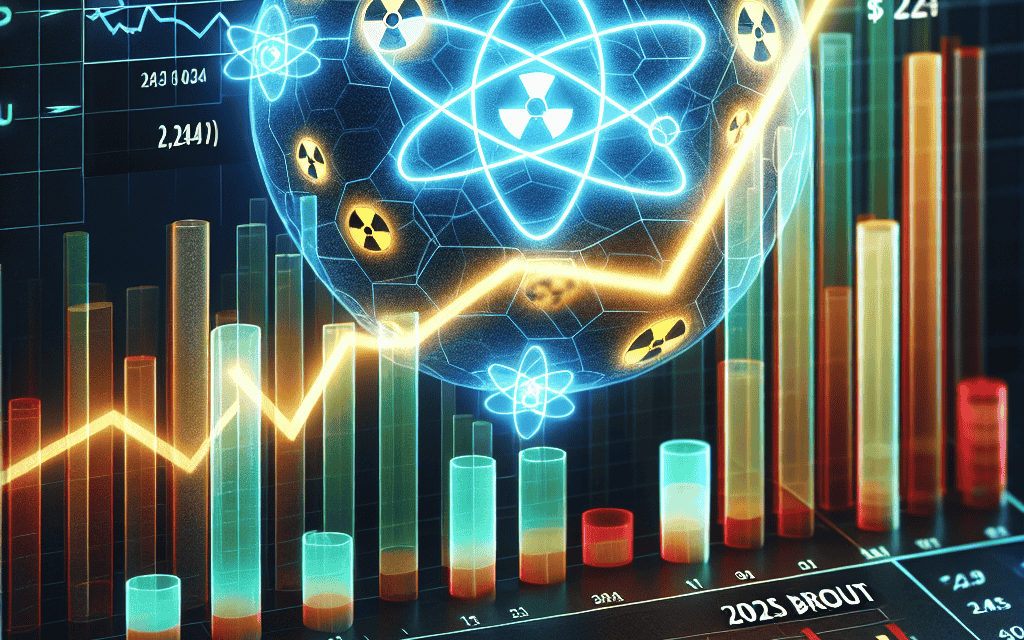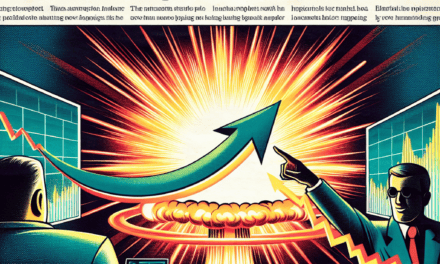“NUKZ: Powering the Future with Unstoppable Energy Gains!”
Introduction
NUKZ: 2024’s Breakout Nuclear Energy ETF Sensation is revolutionizing the investment landscape with its strategic focus on the burgeoning nuclear energy sector. As global demand for clean and sustainable energy sources intensifies, NUKZ emerges as a pivotal player, offering investors unparalleled access to a diversified portfolio of leading nuclear energy companies. This innovative ETF captures the momentum of technological advancements and policy shifts favoring nuclear power, positioning itself as a key driver in the transition to a low-carbon future. With its robust performance and forward-thinking approach, NUKZ is set to redefine the benchmarks for success in the energy investment arena.
Understanding NUKZ: The Rise Of A Nuclear Energy ETF Sensation In 2024
In the rapidly evolving landscape of energy investment, 2024 has witnessed the emergence of NUKZ, a nuclear energy exchange-traded fund (ETF) that has captured the attention of investors worldwide. As the global community increasingly prioritizes sustainable and low-carbon energy sources, nuclear power has re-emerged as a viable solution to meet these demands. NUKZ, with its strategic focus on the nuclear energy sector, has positioned itself as a frontrunner in this burgeoning market, offering investors a unique opportunity to capitalize on the growth of nuclear energy.
The rise of NUKZ can be attributed to several key factors that have converged to create a favorable environment for nuclear energy investments. Firstly, the global push towards decarbonization has intensified, with governments and corporations alike committing to ambitious carbon neutrality goals. This shift has reignited interest in nuclear power, which is recognized for its ability to generate large amounts of electricity with minimal greenhouse gas emissions. Consequently, NUKZ has benefited from this renewed focus, as investors seek to align their portfolios with sustainable energy solutions.
Moreover, technological advancements in nuclear energy have played a crucial role in bolstering the appeal of NUKZ. Innovations such as small modular reactors (SMRs) and advancements in nuclear fusion technology have the potential to revolutionize the industry by offering safer, more efficient, and cost-effective alternatives to traditional nuclear reactors. These developments have not only enhanced the viability of nuclear power but have also attracted significant investment interest, further propelling NUKZ’s growth.
In addition to technological progress, geopolitical considerations have also influenced the rise of NUKZ. The ongoing energy crisis, exacerbated by geopolitical tensions and supply chain disruptions, has underscored the need for energy security and diversification. Nuclear energy, with its ability to provide a stable and reliable power supply, has emerged as a strategic asset for countries seeking to reduce their dependence on fossil fuels and enhance their energy resilience. As a result, NUKZ has gained traction among investors looking to hedge against energy market volatility and geopolitical risks.
Furthermore, the financial performance of NUKZ has been a testament to its growing prominence in the investment community. Since its inception, the ETF has delivered impressive returns, driven by the strong performance of its underlying assets, which include leading nuclear energy companies and innovative technology firms. This robust financial performance has not only attracted institutional investors but has also piqued the interest of retail investors seeking exposure to the nuclear energy sector.
As NUKZ continues to gain momentum, it is essential to consider the potential challenges and risks associated with investing in nuclear energy. Regulatory hurdles, public perception, and the high costs associated with nuclear projects remain significant obstacles that could impact the sector’s growth trajectory. However, with continued innovation and supportive policy frameworks, these challenges may be mitigated, paving the way for sustained growth in the nuclear energy market.
In conclusion, NUKZ has emerged as a breakout sensation in 2024, driven by a confluence of factors including the global push for decarbonization, technological advancements, geopolitical considerations, and strong financial performance. As the world grapples with the dual challenges of energy security and climate change, NUKZ offers a compelling investment opportunity for those seeking to participate in the transition to a sustainable energy future. With its strategic focus on the nuclear energy sector, NUKZ is poised to play a pivotal role in shaping the future of energy investment.
Investment Strategies: How To Maximize Returns With NUKZ
As the global energy landscape continues to evolve, investors are increasingly turning their attention to sustainable and reliable energy sources. Among these, nuclear energy has emerged as a compelling option, offering a low-carbon alternative to fossil fuels. In this context, the NUKZ ETF has captured the attention of investors in 2024, positioning itself as a breakout sensation in the nuclear energy sector. Understanding how to maximize returns with NUKZ requires a strategic approach, blending market insights with a keen awareness of the broader energy transition.
To begin with, it is essential to recognize the factors driving the renewed interest in nuclear energy. As countries strive to meet ambitious carbon reduction targets, nuclear power offers a stable and efficient solution. Unlike intermittent renewable sources such as wind and solar, nuclear energy provides a consistent output, making it a reliable backbone for national grids. This reliability, coupled with advancements in nuclear technology, has led to increased investment in the sector, creating a fertile ground for ETFs like NUKZ to thrive.
Investors looking to capitalize on NUKZ’s potential should first consider the ETF’s composition. NUKZ is designed to track a diverse range of companies involved in the nuclear energy supply chain, from uranium mining firms to reactor manufacturers and service providers. This diversification helps mitigate risks associated with individual company performance, while also offering exposure to the entire nuclear ecosystem. By understanding the ETF’s holdings, investors can better assess the potential for growth and identify key drivers of performance.
Moreover, timing plays a crucial role in maximizing returns with NUKZ. The nuclear energy sector is subject to regulatory changes, geopolitical dynamics, and technological advancements, all of which can impact market sentiment. Staying informed about policy developments, such as government incentives for nuclear projects or shifts in energy policy, can provide valuable insights into the sector’s trajectory. Additionally, monitoring technological breakthroughs, such as advancements in small modular reactors or nuclear fusion, can offer clues about future growth opportunities.
Another important consideration is the broader economic environment. Inflationary pressures, interest rate fluctuations, and currency movements can all influence the performance of energy-related investments. For instance, rising inflation may increase the cost of capital for nuclear projects, potentially affecting profitability. Conversely, a favorable interest rate environment could lower financing costs, enhancing returns. By keeping an eye on macroeconomic indicators, investors can make informed decisions about when to enter or exit positions in NUKZ.
Furthermore, risk management is a critical component of any investment strategy. While NUKZ offers diversification within the nuclear sector, it is still subject to market volatility and sector-specific risks. Implementing stop-loss orders, setting realistic profit targets, and regularly reviewing portfolio allocations can help mitigate potential losses. Additionally, considering complementary investments in other energy sectors, such as renewables or energy storage, can provide a balanced approach to energy investing.
In conclusion, maximizing returns with NUKZ requires a comprehensive understanding of the nuclear energy landscape, coupled with strategic investment decisions. By analyzing the ETF’s composition, staying informed about industry developments, and considering macroeconomic factors, investors can position themselves to benefit from the growth potential of nuclear energy. As the world continues to seek sustainable energy solutions, NUKZ stands out as a promising vehicle for those looking to participate in the nuclear renaissance.
NUKZ Vs. Traditional Energy ETFs: A Comparative Analysis
In the rapidly evolving landscape of energy investment, the emergence of NUKZ as a breakout nuclear energy ETF in 2024 has captured the attention of investors and analysts alike. As the world increasingly shifts towards sustainable and low-carbon energy sources, nuclear energy is gaining renewed interest due to its potential to provide a stable and reliable power supply. This shift has positioned NUKZ as a formidable contender against traditional energy ETFs, which have long dominated the market. To understand the implications of this development, it is essential to conduct a comparative analysis of NUKZ and its traditional counterparts.
Firstly, it is important to consider the composition of NUKZ. Unlike traditional energy ETFs, which typically include a mix of fossil fuel companies, renewable energy firms, and utility providers, NUKZ is exclusively focused on the nuclear energy sector. This specialization allows NUKZ to capitalize on the unique advantages of nuclear power, such as its low greenhouse gas emissions and high energy density. As global efforts to combat climate change intensify, these attributes make nuclear energy an attractive option for countries seeking to reduce their carbon footprints. Consequently, NUKZ’s targeted approach offers investors a direct avenue to participate in the growth of this sector.
In contrast, traditional energy ETFs often face challenges related to the volatility of fossil fuel markets. Fluctuations in oil and gas prices, driven by geopolitical tensions and supply-demand imbalances, can significantly impact the performance of these funds. Moreover, the increasing regulatory pressures and societal push towards decarbonization are prompting many traditional energy companies to diversify their portfolios, which may dilute their focus and affect returns. In this context, NUKZ’s concentration on nuclear energy provides a more stable investment opportunity, as it is less susceptible to the price swings associated with fossil fuels.
Furthermore, the technological advancements in nuclear energy are enhancing its appeal. Innovations in reactor design, such as small modular reactors (SMRs) and advanced nuclear technologies, promise to address some of the historical concerns associated with nuclear power, including safety and waste management. These developments are likely to drive further investment in the sector, benefiting NUKZ and its stakeholders. In comparison, while traditional energy ETFs may include companies investing in renewable technologies, the intermittent nature of solar and wind power still poses challenges for grid reliability, which nuclear energy can help mitigate.
Another critical factor in this comparative analysis is the policy environment. Governments worldwide are increasingly recognizing the role of nuclear energy in achieving energy security and meeting climate goals. Supportive policies, such as subsidies and tax incentives for nuclear projects, are expected to bolster the growth of the sector. NUKZ, by aligning with these policy trends, stands to gain from favorable regulatory conditions. On the other hand, traditional energy ETFs may encounter headwinds as fossil fuel subsidies are phased out and stricter emissions regulations are implemented.
In conclusion, while traditional energy ETFs have long been a staple in investment portfolios, the rise of NUKZ as a breakout nuclear energy ETF in 2024 presents a compelling alternative. Its focus on the nuclear sector, coupled with the advantages of technological advancements and supportive policy frameworks, positions NUKZ as a promising investment opportunity. As the global energy landscape continues to evolve, investors seeking to align their portfolios with sustainable and reliable energy sources may find NUKZ to be an attractive option, offering both stability and growth potential in an increasingly uncertain world.
The Future Of Clean Energy: NUKZ’s Role In The Global Energy Transition

As the world grapples with the pressing need to transition to cleaner energy sources, nuclear power has emerged as a pivotal player in the global energy landscape. In this context, NUKZ, a nuclear energy exchange-traded fund (ETF), has captured the attention of investors and environmentalists alike as a breakout sensation in 2024. This ETF is uniquely positioned to capitalize on the growing momentum behind nuclear energy, which is increasingly being recognized for its potential to provide a stable and low-carbon energy supply.
The resurgence of interest in nuclear energy is driven by several factors. Firstly, the urgency to reduce carbon emissions has never been greater, with governments worldwide setting ambitious targets to combat climate change. Nuclear power, with its ability to generate large amounts of electricity without emitting greenhouse gases, offers a viable solution to meet these targets. Furthermore, advancements in nuclear technology, such as small modular reactors and improved safety measures, have addressed many of the concerns that previously hindered the expansion of nuclear energy.
In this evolving landscape, NUKZ stands out as a strategic investment vehicle. By focusing on companies involved in the nuclear energy sector, NUKZ provides investors with exposure to a diverse range of businesses, from uranium mining and nuclear plant construction to technology firms developing innovative reactor designs. This diversification not only mitigates risk but also positions NUKZ to benefit from the entire nuclear energy value chain. As a result, investors are increasingly viewing NUKZ as a means to align their portfolios with the global shift towards sustainable energy.
Moreover, the geopolitical landscape is also playing a crucial role in the renewed interest in nuclear energy. With energy security becoming a top priority for many nations, nuclear power offers a reliable and domestically sourced energy option. This is particularly relevant in regions that are heavily dependent on fossil fuel imports, as nuclear energy can reduce reliance on volatile international markets. Consequently, countries are revisiting their nuclear policies, leading to increased investments and favorable regulatory environments that further bolster the prospects of NUKZ.
In addition to these macroeconomic and geopolitical factors, the financial performance of NUKZ has been noteworthy. Since its inception, the ETF has demonstrated robust growth, driven by strong demand for nuclear energy stocks. This performance is underpinned by the solid fundamentals of the companies within its portfolio, many of which are at the forefront of technological advancements and operational efficiency in the nuclear sector. As these companies continue to innovate and expand, NUKZ is well-positioned to deliver long-term value to its investors.
Furthermore, the role of nuclear energy in achieving a balanced energy mix cannot be overstated. While renewable sources like wind and solar are essential components of a sustainable future, their intermittent nature necessitates a reliable baseload power source. Nuclear energy, with its ability to provide consistent and large-scale electricity generation, complements renewables and ensures grid stability. This synergy between nuclear and renewable energy sources is critical for a successful energy transition, and NUKZ is poised to play a significant role in facilitating this integration.
In conclusion, NUKZ’s emergence as a breakout nuclear energy ETF sensation in 2024 underscores the growing recognition of nuclear power’s importance in the global energy transition. By offering a diversified investment in the nuclear sector, NUKZ not only aligns with the world’s clean energy goals but also provides investors with a compelling opportunity to participate in the future of sustainable energy. As the world continues to navigate the complexities of climate change and energy security, NUKZ is set to be a key player in shaping the future of clean energy.
Risk And Reward: Evaluating The Volatility Of NUKZ In 2024
In the ever-evolving landscape of energy investment, 2024 has witnessed the emergence of NUKZ, a nuclear energy exchange-traded fund (ETF) that has captured the attention of investors worldwide. As the global community increasingly turns towards sustainable and low-carbon energy sources, nuclear energy is experiencing a renaissance, and NUKZ is at the forefront of this movement. However, with any investment, particularly in a sector as complex and historically contentious as nuclear energy, there are inherent risks and rewards that must be carefully evaluated. Understanding the volatility of NUKZ in 2024 is crucial for investors seeking to navigate this promising yet unpredictable market.
To begin with, the allure of NUKZ lies in its strategic focus on companies involved in the nuclear energy supply chain, from uranium mining to reactor technology and waste management. This comprehensive approach allows investors to gain exposure to the entire nuclear energy ecosystem, potentially reaping significant returns as the demand for clean energy solutions grows. The global push for decarbonization, coupled with technological advancements in nuclear reactor design, has positioned nuclear energy as a viable alternative to fossil fuels. Consequently, NUKZ has attracted substantial interest from both institutional and retail investors eager to capitalize on this trend.
Nevertheless, the volatility of NUKZ cannot be overlooked. One of the primary factors contributing to this volatility is the regulatory environment surrounding nuclear energy. Governments worldwide are grappling with the dual challenges of ensuring energy security and addressing environmental concerns. As a result, policy shifts can have profound impacts on the nuclear sector, influencing everything from licensing and construction of new plants to the decommissioning of older facilities. For instance, a favorable regulatory change in one country could lead to a surge in NUKZ’s value, while a sudden policy reversal elsewhere might trigger a sharp decline.
Moreover, geopolitical tensions can also play a significant role in the volatility of NUKZ. The uranium supply chain is particularly susceptible to international relations, as key uranium-producing regions may experience political instability or trade disputes. Such disruptions can lead to fluctuations in uranium prices, directly affecting the performance of NUKZ. Investors must remain vigilant and informed about global political developments to anticipate potential impacts on their investments.
In addition to regulatory and geopolitical factors, technological advancements and public perception are critical elements influencing NUKZ’s volatility. Breakthroughs in nuclear technology, such as the development of small modular reactors (SMRs) and advancements in nuclear fusion, could enhance the attractiveness of nuclear energy, driving up the value of NUKZ. Conversely, public opposition to nuclear energy, often fueled by safety concerns and historical incidents, can lead to increased scrutiny and regulatory hurdles, thereby affecting investor confidence and market stability.
Despite these challenges, the potential rewards of investing in NUKZ are substantial. As countries strive to meet ambitious climate targets, the demand for reliable and low-carbon energy sources is expected to rise, providing a favorable backdrop for nuclear energy. Investors who can adeptly navigate the complexities of the nuclear sector may find NUKZ to be a valuable addition to their portfolios, offering both growth potential and diversification benefits.
In conclusion, while NUKZ presents an exciting opportunity in the realm of nuclear energy investment, it is not without its risks. The volatility of this ETF in 2024 is shaped by a myriad of factors, including regulatory changes, geopolitical dynamics, technological advancements, and public sentiment. Investors must carefully weigh these elements, employing a strategic approach to manage risk and capitalize on the rewards that NUKZ has to offer. As the world continues its transition towards sustainable energy, NUKZ stands as a testament to the evolving landscape of investment opportunities in the nuclear sector.
The Impact Of NUKZ On The Nuclear Energy Sector
The emergence of NUKZ as a breakout nuclear energy ETF in 2024 has significantly impacted the nuclear energy sector, marking a pivotal moment in the industry’s evolution. As global energy demands continue to rise and the urgency to transition to cleaner energy sources intensifies, nuclear energy has re-emerged as a viable solution. NUKZ, with its strategic focus on nuclear energy companies, has not only captured the attention of investors but also catalyzed a broader interest in the sector.
To understand the impact of NUKZ, it is essential to consider the context in which it was launched. The global energy landscape is undergoing a transformation, driven by the dual imperatives of reducing carbon emissions and ensuring energy security. In this environment, nuclear energy offers a compelling proposition due to its ability to provide a stable and low-carbon energy supply. NUKZ has capitalized on this potential by offering investors exposure to a diversified portfolio of companies involved in various aspects of the nuclear energy value chain, from uranium mining to reactor technology and waste management.
The introduction of NUKZ has had a ripple effect across the nuclear energy sector. Firstly, it has provided a much-needed influx of capital to companies that are at the forefront of nuclear innovation. This financial support is crucial for advancing research and development efforts, particularly in areas such as small modular reactors (SMRs) and next-generation nuclear technologies. By channeling investment into these cutting-edge technologies, NUKZ is helping to accelerate their commercialization and deployment, thereby enhancing the sector’s overall growth prospects.
Moreover, NUKZ has played a significant role in reshaping investor perceptions of nuclear energy. Historically, the sector has faced challenges related to public perception, regulatory hurdles, and high capital costs. However, the ETF’s success has underscored the growing recognition of nuclear energy’s role in achieving a sustainable energy future. As more investors become aware of the potential returns and environmental benefits associated with nuclear energy, there is a renewed sense of optimism and confidence in the sector’s long-term viability.
In addition to attracting new investment, NUKZ has also fostered greater collaboration within the nuclear energy industry. By bringing together a diverse range of companies under a single investment vehicle, the ETF has facilitated knowledge sharing and strategic partnerships. This collaborative approach is essential for addressing the complex challenges facing the sector, such as improving safety standards, reducing costs, and managing nuclear waste. Through these partnerships, companies can leverage each other’s expertise and resources, ultimately driving innovation and efficiency.
Furthermore, the success of NUKZ has prompted policymakers to take a closer look at the regulatory frameworks governing nuclear energy. Recognizing the potential economic and environmental benefits of a robust nuclear sector, governments are increasingly considering policy reforms to support its growth. This includes streamlining licensing processes, providing financial incentives for research and development, and investing in infrastructure to support new nuclear projects. As a result, NUKZ is not only influencing the financial landscape but also shaping the policy environment in which the nuclear energy sector operates.
In conclusion, NUKZ’s emergence as a breakout nuclear energy ETF in 2024 has had a profound impact on the sector. By attracting investment, reshaping perceptions, fostering collaboration, and influencing policy, NUKZ is playing a crucial role in driving the nuclear energy industry’s growth and transformation. As the world continues to seek sustainable energy solutions, the significance of NUKZ’s contribution to the nuclear energy sector cannot be overstated.
Why NUKZ Is A Must-Have In Your 2024 Investment Portfolio
As the world continues to grapple with the dual challenges of climate change and energy security, nuclear energy is increasingly being recognized as a vital component of a sustainable energy future. In this context, NUKZ, a nuclear energy exchange-traded fund (ETF), has emerged as a standout investment opportunity for 2024. This ETF is rapidly gaining attention for its strategic focus on the nuclear energy sector, which is poised for significant growth in the coming years. Investors seeking to diversify their portfolios and capitalize on the burgeoning demand for clean energy solutions should consider NUKZ as a compelling option.
One of the primary reasons NUKZ is attracting interest is its well-curated portfolio of companies that are at the forefront of nuclear technology and innovation. The ETF includes a diverse range of firms, from established nuclear power plant operators to cutting-edge technology developers working on next-generation reactors. This diversification not only mitigates risk but also positions investors to benefit from various facets of the nuclear energy industry. As countries around the world commit to reducing carbon emissions, the demand for reliable and low-carbon energy sources is expected to rise, providing a favorable environment for the companies within NUKZ’s portfolio.
Moreover, the geopolitical landscape is increasingly influencing energy strategies, with many nations seeking to reduce their dependence on fossil fuels and enhance energy security. Nuclear energy, with its ability to provide a stable and continuous power supply, is becoming an attractive option for governments aiming to achieve these goals. NUKZ is strategically positioned to capitalize on this trend, as it includes companies that are not only expanding their nuclear capabilities but also engaging in international collaborations to develop and deploy nuclear technology globally. This international dimension adds another layer of growth potential for investors.
In addition to its strategic portfolio composition, NUKZ benefits from a favorable regulatory environment. Many governments are implementing policies to support the expansion of nuclear energy, recognizing its role in achieving net-zero emissions targets. These policies include financial incentives, streamlined permitting processes, and increased funding for research and development. Such regulatory support is likely to drive growth in the nuclear sector, further enhancing the prospects for NUKZ.
Furthermore, technological advancements are playing a crucial role in the resurgence of nuclear energy. Innovations such as small modular reactors (SMRs) and advanced fuel cycles are making nuclear power more efficient, cost-effective, and safer. NUKZ’s inclusion of companies that are pioneering these technologies positions it at the cutting edge of the industry. As these technologies become commercially viable, they are expected to revolutionize the nuclear energy landscape, offering significant returns for investors in NUKZ.
While the potential for growth is substantial, it is important to acknowledge the risks associated with investing in the nuclear sector. Public perception, regulatory hurdles, and the high capital costs of nuclear projects can pose challenges. However, NUKZ’s diversified approach and focus on innovation help mitigate these risks, making it a resilient investment choice.
In conclusion, NUKZ represents a unique opportunity for investors seeking exposure to the nuclear energy sector, which is poised for transformative growth. Its strategic portfolio, alignment with global energy trends, and focus on technological innovation make it a must-have in any forward-looking investment portfolio for 2024. As the world transitions to a more sustainable energy future, NUKZ offers a promising avenue for investors to participate in this critical shift.
Q&A
1. **What is NUKZ?**
NUKZ is an exchange-traded fund (ETF) focused on investing in companies within the nuclear energy sector, launched in 2024.
2. **Why is NUKZ considered a breakout sensation?**
NUKZ gained significant attention due to its rapid growth, innovative investment strategy, and the increasing global interest in nuclear energy as a clean energy source.
3. **What companies does NUKZ invest in?**
NUKZ invests in a diverse range of companies involved in nuclear energy production, technology development, uranium mining, and related infrastructure.
4. **What factors contributed to NUKZ’s success in 2024?**
Factors include rising energy demands, geopolitical shifts favoring energy independence, advancements in nuclear technology, and increased government support for nuclear energy.
5. **How does NUKZ differentiate itself from other energy ETFs?**
NUKZ focuses exclusively on nuclear energy, offering targeted exposure to this sector, unlike broader energy ETFs that include fossil fuels and renewables.
6. **What are the risks associated with investing in NUKZ?**
Risks include regulatory changes, nuclear accidents, public perception issues, and market volatility affecting the nuclear sector.
7. **What is the outlook for NUKZ beyond 2024?**
The outlook is positive, with continued interest in sustainable energy solutions and potential technological advancements in nuclear energy driving future growth.
Conclusion
NUKZ: 2024’s Breakout Nuclear Energy ETF Sensation has emerged as a standout performer in the investment landscape, capitalizing on the growing global emphasis on clean and sustainable energy sources. As countries strive to meet ambitious carbon reduction targets, nuclear energy is increasingly recognized for its potential to provide reliable, low-emission power. NUKZ has successfully positioned itself by offering investors exposure to a diversified portfolio of companies involved in nuclear energy production, technology, and infrastructure. Its strategic focus on innovation and safety advancements within the nuclear sector has attracted significant investor interest, driving impressive growth and solidifying its status as a key player in the energy ETF market. With the ongoing transition to greener energy solutions, NUKZ is poised to maintain its momentum, offering both financial returns and a contribution to the global sustainability agenda.





